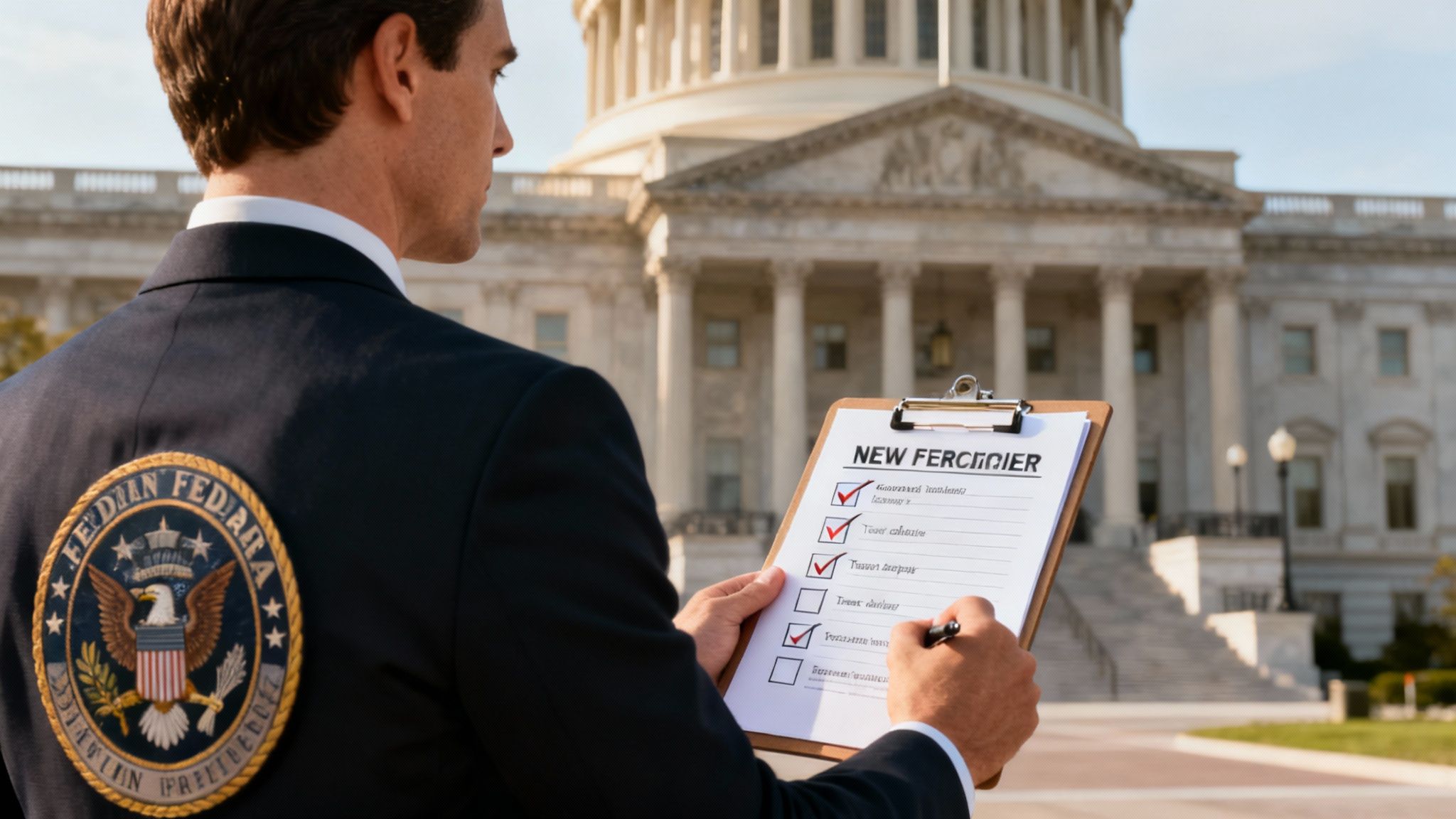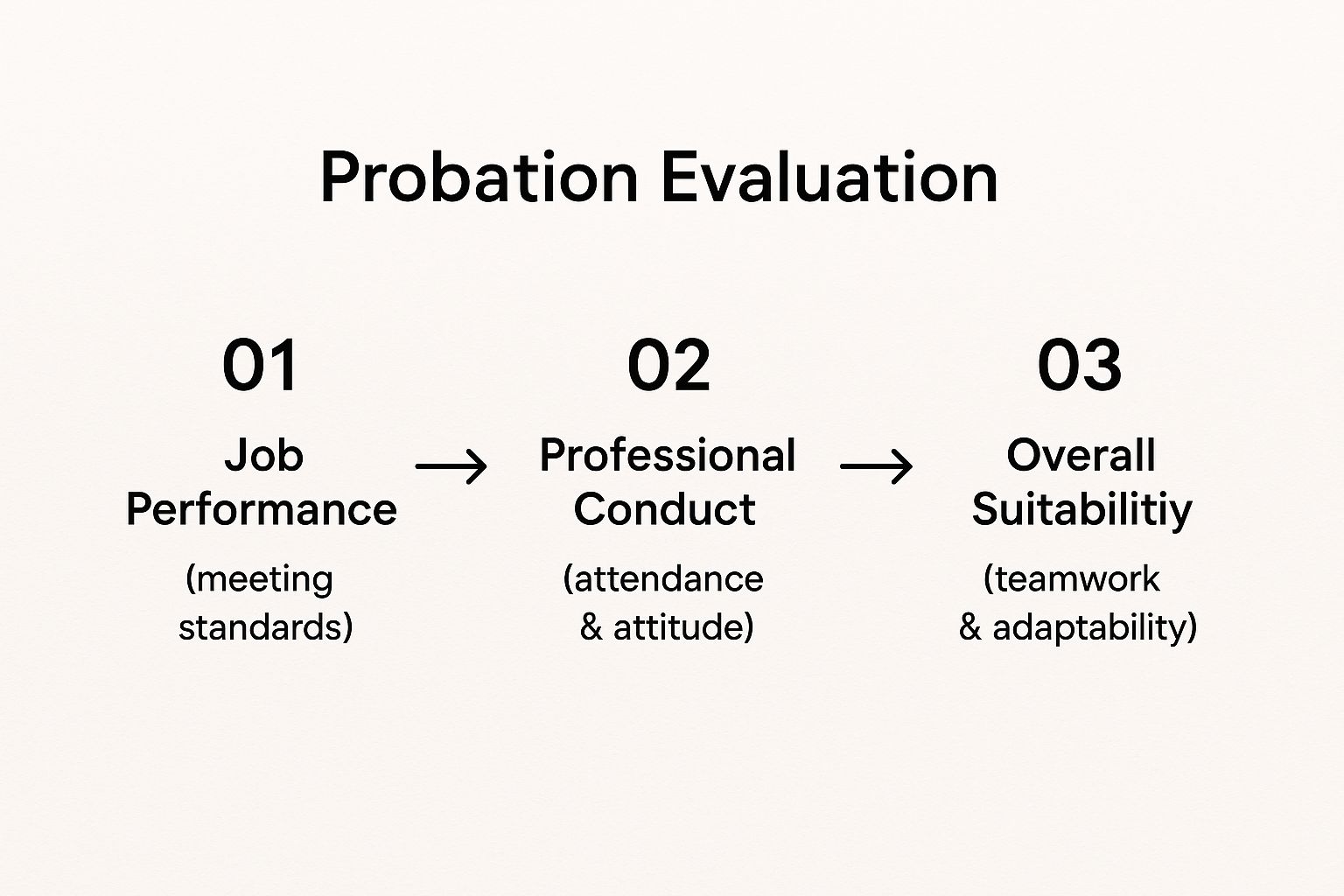Blogs

Blog title place here
We understand that every federal employee's situation is unique. Our solutions are designed to fit your specific needs.

Blog title place here
We understand that every federal employee's situation is unique. Our solutions are designed to fit your specific needs.

Blog title place here
We understand that every federal employee's situation is unique. Our solutions are designed to fit your specific needs.
Navigating the Federal Employee Probationary Period
The federal employee probationary period is a critical trial phase for new government hires. Think of it as the final, and most important, stage of your job interview. During this time, your performance, conduct, and overall suitability are closely evaluated before you're granted permanent status with full civil service protections. It's a standard, but very serious, part of starting a federal career.
What Exactly Is the Federal Probationary Period?

Imagine taking a new car for an extended "test drive" before you commit to buying it. That’s pretty much what the federal probationary period is—for both you and your new agency. The government uses this time to make sure you’re truly the right person for the job, and you get to decide if the agency is the right fit for you.
This isn’t just a formality; it's a foundational piece of the federal hiring process. The government puts a lot of time and money into recruiting and training people. This trial period is its way of making sure that investment pays off by confirming you can handle the real-world demands of the role.
To give you a quick snapshot, here’s a breakdown of the key elements.
Federal Probationary Period at a Glance
This table offers a quick summary of the essential elements of the probationary period, giving you a clear overview of what to expect from the start.
| Aspect | Typical Duration | Primary Purpose | Employee Rights |
|---|---|---|---|
| Duration | 1 year for most competitive service positions | To evaluate a new employee's on-the-job performance, conduct, and overall suitability | Limited appeal rights for termination; protections against discrimination apply |
| Evaluation | Regular feedback and formal performance appraisals | To ensure the employee can meet the standards of the position before permanent status | Entitled to clear expectations and performance standards from their supervisor |
| Conversion | Automatic upon successful completion | To transition the employee to a career appointment with full civil service protections | Gains full appeal rights to the MSPB for adverse actions |
| Management Action | Simpler process for termination if necessary | To provide management flexibility to address poor performance or misconduct early on | Must be notified in writing of the reasons for termination during probation |
This "at a glance" view helps frame the purpose and stakes of your first year in federal service.
The Purpose from the Agency's Perspective
For the agency, the probationary period is all about risk management. It’s a structured timeframe to see how a new hire actually performs before granting them the significant job protections that come with a permanent federal position. During this trial, it's much simpler for a manager to address performance or conduct issues.
The core function of the probationary period is to give the agency a final opportunity to observe an employee's work and conduct firsthand. It allows for the correction of hiring mistakes before an employee gains full career status and the associated appeal rights.
In short, it’s a crucial safeguard. It helps ensure that only people who have proven they can do the job well become long-term members of the federal workforce.
What It Means for You
So, what does this all mean for you as the new employee? This is your time to shine. It's your chance to really dig in, learn the agency’s culture, master your duties, and build good working relationships with your colleagues and supervisor.
Successfully completing your probationary period is the last hurdle to securing your position. Once you're through it, you unlock the full benefits and stability of a federal career, officially transitioning from a "newbie" to a tenured employee.
How Long You Will Be on Probation
https://www.youtube.com/embed/w6Vbwcjjx_g
One of the first questions almost every new federal employee asks is, "So, how long does this last?" The truth is, the federal employee probationary period isn't a one-size-fits-all deal. The length really depends on the type of service you've been hired into.
For the vast majority of folks coming into the competitive service, the probationary period is a straightforward one-year term. This covers most of the traditional government jobs you see posted, the ones filled through the standard competitive hiring process.
However, things are a bit different if your position is in the excepted service. These roles—think of certain jobs at the FBI, CIA, or highly specialized scientific posts—often come with a longer, two-year probationary period. The nature of these jobs just requires a more extended evaluation period.
Who Is Subject to Probation
It's a common misunderstanding that probation is just for entry-level staff. The reality is, nearly every new permanent federal employee goes through this trial phase. It doesn’t matter if you’re an administrative assistant, a park ranger, an IT specialist, or a research scientist—you can bet you'll have a probationary period to complete.
This is why getting a handle on your specific timeline is so important from the get-go. Your job security and your rights as an employee are directly tied to your probationary status. You'll find the exact length and terms spelled out in your official job offer and on your initial SF-50, the personnel action form.
Knowing the exact end date of your probationary period is crucial. This date marks the official transition from a new hire with limited protections to a tenured employee with full civil service rights.
This affects a massive number of people. Recent data from the Office of Personnel Management shows that as of May 2024, over 200,000 federal employees had been on the job for less than a year. The Department of Veterans Affairs had over 56,000 staff in this category, and the Department of the Army had more than 19,500 civilian employees still navigating their first year, all under probationary rules. You can dig into more details on which federal agencies are firing new hires on Govexec.com.
Why the Timelines Differ
So why the different timelines? It all boils down to the nature of the work and how you were hired.
Competitive Service (1 Year): This is the gold standard because, for most government jobs, a year is considered plenty of time to see if an employee is a good fit. It strikes a fair balance, giving the agency enough time to evaluate performance while offering the employee a clear path to career status.
Excepted Service (2 Years): These jobs often involve unique responsibilities, sensitive information, or highly specialized skills. A longer, two-year window gives the agency the time it needs to thoroughly assess an employee's judgment, reliability, and overall performance in roles where the stakes can be much higher.
At the end of the day, your appointment type sets the length of your "trial period." Knowing which one applies to you from day one helps you set clear goals for successfully navigating and completing your federal employee probationary period.
Understanding Your Rights and Protections

Navigating the federal employee probationary period can feel like you’re walking on a tightrope. It's completely normal to wonder what your rights are if things start to go sideways. While your protections are definitely more limited during this time, they aren’t nonexistent. Knowing exactly what they are is the key to your peace of mind and job security during this critical first year.
Here’s a helpful way to think about it: a probationary employee is like a "tenant-at-will," while a tenured employee is more like a "leaseholder." The leaseholder has a formal contract with extensive legal protections against eviction. The tenant-at-will, on the other hand, has a more flexible arrangement—which also means the landlord can end the tenancy with far less process.
This analogy gets right to the heart of the difference in job security. As a probationer, your agency has a lot more leeway to terminate your employment if your performance or conduct doesn't hit the mark. But that doesn't mean they can just let you go for any old reason with no process at all.
Your Fundamental Protections
Even with fewer appeal options, you still have basic rights. The most important one is the right to a written notice. If your agency decides to let you go during your probation, they are required to give you a document in writing that spells out the reasons for their decision.
This notice has to explain why your performance or conduct was deemed unsatisfactory. So, while you might not have the same appeal rights as a permanent employee, this rule ensures the agency at least has a documented, job-related reason for its action.
Limited Appeal Rights to the MSPB
One of the most significant differences between a probationary and a tenured employee is access to the Merit Systems Protection Board (MSPB). For tenured employees, the MSPB is the main arena for appealing major actions like termination. For a probationer, that door is mostly closed—but there are a few important exceptions.
A probationary employee generally cannot appeal a termination to the MSPB based on performance. However, you can file an appeal if you have evidence that the termination was based on discrimination or other prohibited practices.
You might have a case for an MSPB appeal if your termination was because of:
- Partisan Political Affiliation: You can't be fired for your political party or personal beliefs.
- Marital Status: Whether you’re single, married, or divorced can't be a factor in your employment.
- Discrimination: It is illegal to be fired based on your race, color, religion, sex, national origin, age, or a disability.
The reality is that employees in the competitive service have minimal rights if terminated during probation. Agencies must provide written notice explaining their reasons, but probationers typically can't make a formal appeal unless they can prove the firing was based on illegal discrimination or other prohibited personnel practices. You can learn more about these specific rules from the MSPB's official report on identifying probationers.
Why You Must Verify Your Status
Finally, never just assume your employment status is correct on paper. Administrative errors happen more often than you'd think. It is absolutely crucial to review your SF-50 (Notification of Personnel Action) to confirm you are correctly classified as a probationary employee.
Sometimes, employees with prior federal service are mistakenly put back into a probationary period when they should already have full rights. Checking your SF-50 ensures you know exactly where you stand and what protections you're truly entitled to.
How Your Performance Will Be Evaluated
It’s tempting to think of the federal employee probationary period as a pass/fail final exam, but that’s not quite right. A better way to look at it is as a continuous, year-long job interview. Every project you tackle, every interaction you have, and every deadline you meet helps build the case for your permanent role.
Ultimately, your supervisor is looking for consistent proof that you’re the right person for the job, a good fit for the team, and a valuable contributor to the agency's mission for the long haul. This isn't about one single moment of brilliance; it’s about the sum of your efforts over time.
This infographic lays out the core components of how you'll be assessed.

As you can see, the evaluation is a three-legged stool: job performance, professional conduct, and overall suitability. Each one is critical to keeping your career balanced and moving forward.
Key Evaluation Criteria
Throughout the year, your supervisor will be paying close attention to how you stack up in these three distinct areas.
Job Performance: This is the most direct part of the evaluation. Can you actually do the work described in your job description and meet the expected standards? They'll be looking at the quality of what you produce, your timeliness, and your technical know-how. Your official performance plan is your roadmap here—it spells out exactly what's expected.
Professional Conduct: How you work is just as important as what you produce. This bucket includes everything from your attendance and punctuality to your overall attitude. Are you reliable? Do you adhere to agency policies? Being a dependable, professional presence is non-negotiable in the federal service.
Overall Suitability: This is a bit more nuanced. It’s all about how you fit into the bigger picture of the team and the agency's culture. They’ll assess your teamwork, communication skills, and adaptability. Are you a collaborative colleague who pitches in? Do you take feedback well and adjust to shifting priorities? They need to know you're a positive force in the workplace.
Practical Tips for a Successful Probation
The best way to get through this period is by being proactive. You are your own best advocate, and taking the reins of your performance is the surest way to get a positive result.
The most successful probationers don't wait for their formal review to see how they're doing. They’re the ones who actively seek feedback, communicate openly, and consistently show their value to the team.
Here are a few actionable steps to put you on the right track:
Maintain Open Communication: Get on your supervisor's calendar for regular check-ins. Don’t be afraid to ask direct questions like, "How am I progressing toward my performance goals?" or "Is there anything you'd like to see me do differently?" It shows you’re engaged and committed to getting it right.
Document Your Accomplishments: You need to be your own historian. Keep a simple log of your achievements, successful projects, and any positive feedback you get from colleagues or supervisors. This isn't for bragging; it’s your evidence file when it comes time for performance reviews.
Understand Your Performance Plan: That performance plan isn't just another piece of government paperwork. It's the rubric they'll use to grade your entire probationary period. Study it, know the metrics, and make sure your daily work aligns with those objectives.
By staying focused on these key areas and actively managing your performance, you can move through your evaluation with confidence and solidify your future as a tenured federal employee.
Crossing the Finish Line: From Probation to Tenure
Reaching the end of your federal employee probationary period isn't just about marking a date on your calendar. It’s a genuine career milestone, kind of like graduating from a tough apprenticeship. You don't just automatically get the certificate; you need that final, positive sign-off from your supervisor confirming you’ve got what it takes.
This whole process of becoming a tenured federal employee has gotten a lot more intentional over the years. It used to be that if your end date came and went and you hadn't been fired, you were pretty much in. It was a passive thing.
That's not how it works anymore. Your agency has to take a specific, deliberate action.
The New Reality of Gaining Career Status
These days, your agency has to actively certify that you’ve successfully completed probation. This isn't just a minor paperwork change—it’s a fundamental shift that makes the end of your probation a real checkpoint. Your supervisor must go on record, formally documenting that you’ve demonstrated the performance, conduct, and overall suitability to stick around for the long haul.
This change has been in the works for a while. The Merit Systems Protection Board (MSPB) was already recommending stronger procedures back in 2005 to make sure only proven employees were getting permanent status. This idea really got teeth with a presidential executive order in April 2025, which made it official: agencies must give explicit approval for you to become permanent. If they don't, your employment simply ends. You can read the details on the White House's official actions page.
What Happens When You Make It
Once your supervisor signs off and your probationary period is officially over, you’re granted career status (or career-conditional status, if you're newer). This is the moment you gain the full rights and protections of a permanent federal employee, and it truly changes the game.
The stability and benefits you unlock at this point are significant and are the bedrock of a long-term federal career.
Completing your federal employee probationary period is your gateway to real job security. The protections you earn are some of the strongest you'll find anywhere, public or private, and they are the foundation of the entire civil service system.
The Powerful Protections You've Earned
By far, the biggest change is gaining full appeal rights. As a tenured employee, you now have the right to appeal major adverse actions—like a suspension, demotion, or removal—to the MSPB. This gives you a powerful due process mechanism that simply wasn't available to you during probation.
Here’s a quick look at how things change:
| Your Status | Termination Process | Appeal Rights |
|---|---|---|
| Probationary | The agency gives written notice with reasons for termination. | Limited to claims of discrimination or partisan politics. |
| Tenured | The agency must follow a detailed, multi-step process to prove their case. | Full appeal rights to the MSPB for adverse actions. |
Getting through this final step solidifies your place in the federal workforce. It gives you the security you need to focus on building a long, meaningful career in public service.
Common Mistakes That Can Derail Your Career

Making it through your federal employee probationary period often comes down to sidestepping a few common, but surprisingly critical, mistakes. We're not just talking about obvious things like missing deadlines. The real career-killers are often the more subtle missteps in how you communicate, take feedback, and approach your new role.
The single biggest error I see is treating the probationary period like a formality. Some new hires get the job and immediately relax, thinking they're "in." That's a dangerous assumption. Your first year isn't a passive waiting game; it’s an active, ongoing interview where your performance is constantly under a microscope.
Another classic mistake is failing to adapt to the agency's culture. Every federal office has its own unwritten rules, communication quirks, and general vibe. If you ignore those social cues, you can come across as a poor fit, even if the quality of your actual work is top-notch.
Ignoring or Resisting Feedback
Of all the potential missteps, the one that can sink you the fastest is how you handle constructive criticism. Look, your supervisors expect you to be learning, which means they also expect you to make some mistakes along the way. The real test isn't whether you mess up—it's how you react when someone points it out.
The ability to graciously accept and act on feedback is one of the strongest indicators of future success. A defensive reaction signals an unwillingness to grow, which is a major red flag for any manager.
Let's play this out. Imagine two new employees are told their reports aren't detailed enough. The first one gets defensive, justifying why they did it that way and making excuses. The second one says, "Thanks for pointing that out. Do you have a good example I could look at?" and then immediately applies the feedback to their next report. Who do you think is building trust and proving their value?
Common Pitfalls to Avoid
Staying aware of these common traps can make all the difference in your first year. Beyond how you handle feedback, here are a few other key behaviors to steer clear of:
- Poor Communication Habits: This could be anything from not responding to emails for a day, to keeping your manager in the dark about your progress, to being too afraid to ask for clarification. Managers can’t read minds, and they value people who communicate proactively.
- Failing to Take Initiative: Just waiting to be told exactly what to do next is a common rookie mistake. You don't want to overstep your bounds, of course, but showing that you can think ahead and take ownership of your duties is a massive plus.
- Neglecting Professional Relationships: It’s easy to get tunnel vision and focus only on your assigned tasks. But ignoring your team can be isolating. Take the time to build positive working relationships with your colleagues and your supervisor—it's essential for your sanity and your long-term success.
By actively avoiding these missteps, you send a clear signal to your agency that you're a professional, adaptable, and valuable addition to the team.
Got Questions? We’ve Got Answers.
Even when you think you have a handle on the federal employee probationary period, real-world scenarios always bring up new questions. Let's tackle some of the most common ones that pop up during that crucial first year.
What if I Transfer to a New Agency?
This is a big one. If you switch to another federal agency while you're still on probation, you'll almost always have to start a brand new probationary period.
Think of it this way: your new agency needs its own time to see how you perform in their specific environment and culture. The clock you built up at your old job, unfortunately, doesn't usually carry over.
Can My Probationary Period Be Extended?
It’s not common, but yes, it can happen. An extension might be granted if you've been away from your duties for a significant chunk of time. This could be due to extended military service or time off for workers' compensation.
The whole point is to give the agency a full year to properly evaluate your performance, so if you weren't there, they need to make up that time.
One quick but important distinction: A probationary period is for new federal employees. A supervisory trial period is something different—it's for current employees who are trying out their first management role to see if leadership is the right fit.
Trying to make sense of your federal benefits can feel like a full-time job in itself, but you don’t have to go it alone. Federal Benefits Sherpa provides one-on-one guidance to help you navigate your career and map out a secure retirement. Schedule your free 15-minute benefits review today and get the clarity you need.

Dedicated to helping Federal employees nationwide.
“Sherpa” - Someone who guides others through complex challenges, helping them navigate difficult decisions and achieve their goals, much like a trusted advisor in the business world.
Email: [email protected]
Phone: (833) 753-1825
© 2024 Federalbenefitssherpa. All rights reserved

